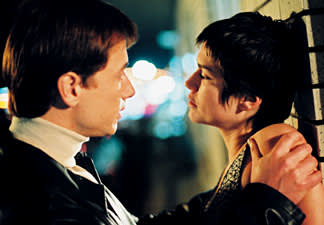This year's Oscar winner for Best Foreign Film, The Barbarian Invasions takes its title from remarks by an intellectual at the beginning of the film who refers to the 9/11 attacks as the possible beginning of the end of the American empire. Not an entirely surprising reference when you consider that the film is the sequel to Denys Arcand's immensely well-received 1986 film The Decline of the American Empire. Reuniting many of the actors, Arcard takes aim at a multitude of middle-aged obsessions, including the Canadian healthcare system, religion and the letdowns of contemporary ideological movements. Less than 20 years later, the clan from that film is reunited when their unofficial leader, Remy (Remy Girard) is diagnosed with cancer and given a death sentence by his doctors. Remy is a scrappy, leftist historian whose penchant for skirt-chasing has left his life a mess. Estranged from his son Sebastien (Stephane Rousseau), a London financier "He is a puritanical capitalist, I'm a sensual socialist" it is he who is left to pick up the pieces of dear old dad's broken life. Using his dollars to grease the system, Sebastien sets his father up in his own hospital floor and later at a house by a lake. He also provides him with another invasion: heroin supplied by Nathalie (Marie-Josee Croze), the daughter of his long-ago mistress. Croze, who won the Best Actress prize at Cannes for this performance, is a powerhouse, quietly stealing every scene that she's in and Rousseau, a comedic superstar in Quebec, is incredibly strong in his first dramatic role. The only fly in the ointment of Arcand's script is his nostalgia-dripping reliance on the reunion scenes. It is difficult to find much to love in this self-congratulating tribe of whiners who bemoan the failure of the system on one hand and brag about their cock-sucking in another. Packaged in two formats, a 112-minute version and a 98-minute version, the only extra is a made for TV documentary that appeared on Quebec television. In it, the cast sit around a table filled with food, wine and ashtrays and debate the meaning of the film in which they participated. Intended as a mirror to the film that inspired it, the conversation is at once compelling, endearing and self-indulgent but never boring. (Alliance Atlantis)
The Barbarian Invasions
Denys Arcand

BY Laura FrancisPublished Aug 1, 2004